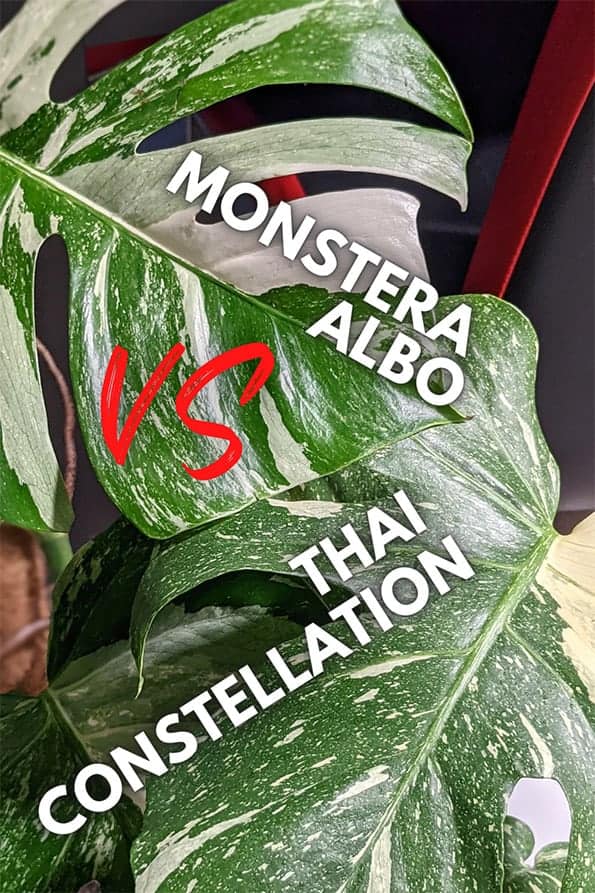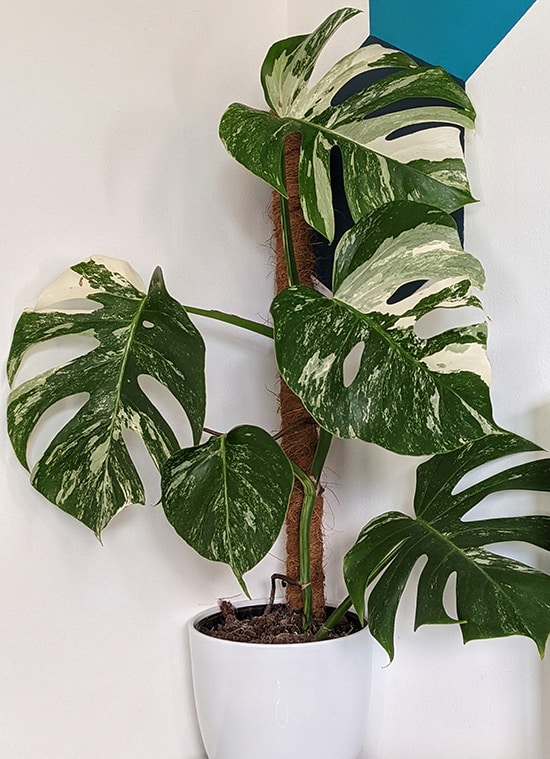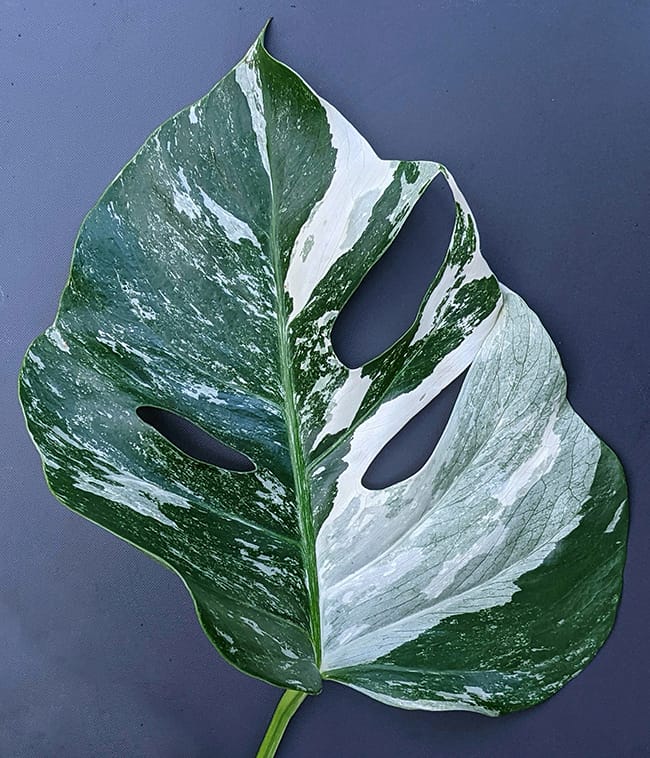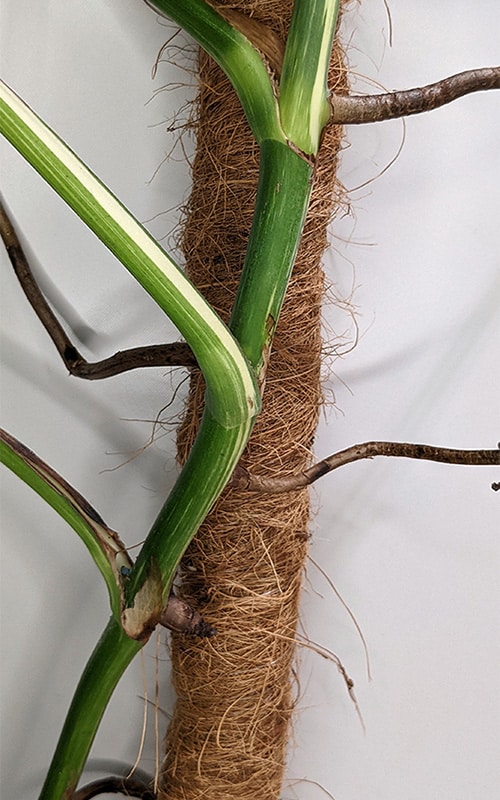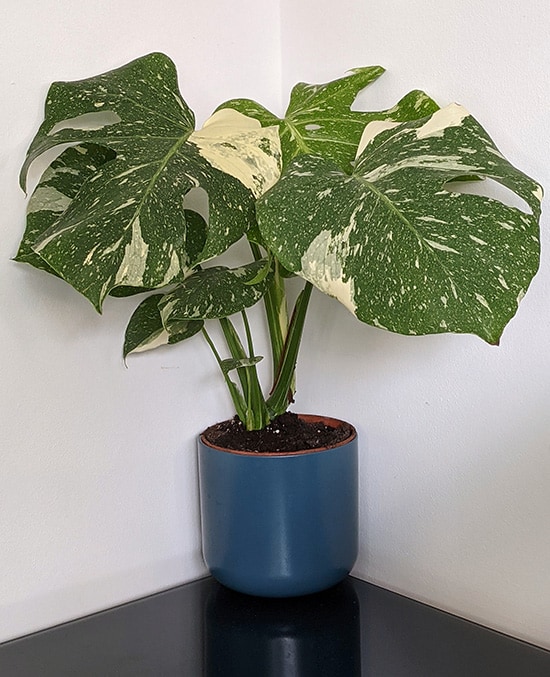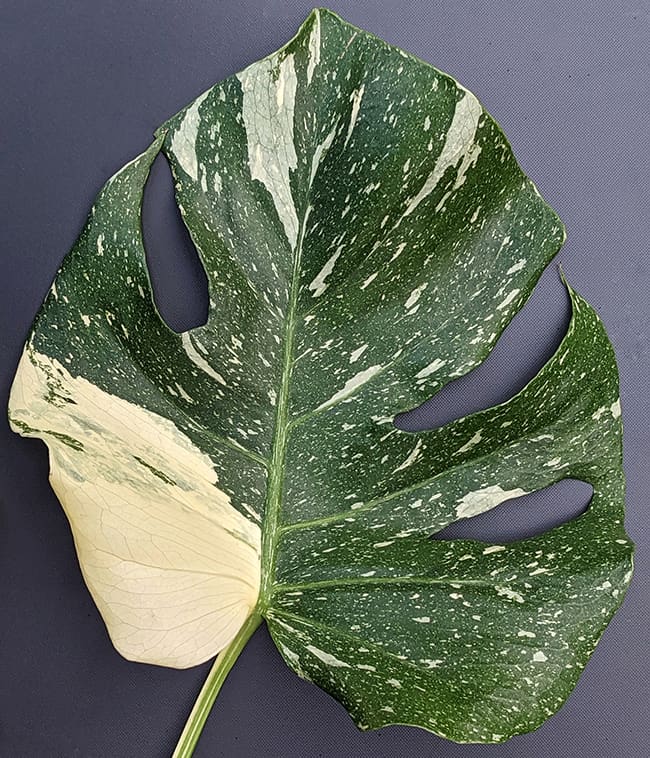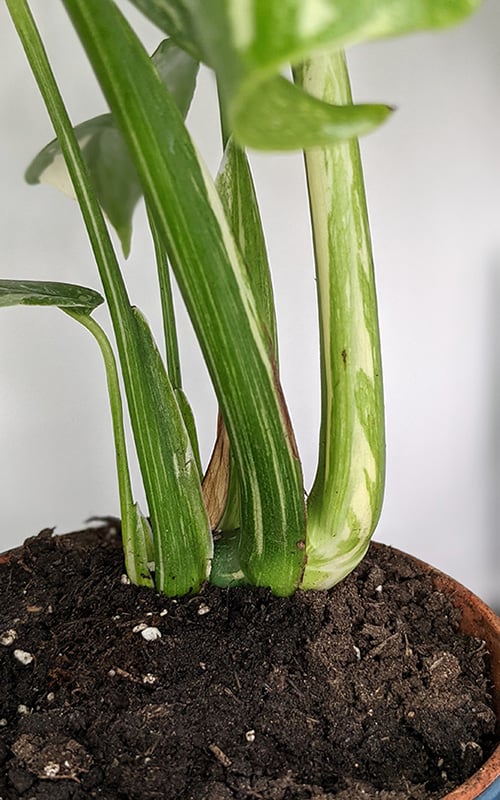By Tom Knight
"What are the differences between Monstera Albo and the Thai Constellation?"
Can you even call yourself a proper houseplant enthusiast if you don't have a Monstera Albo Variegata or Monstera Thai Constellation in your collection (or both!)?
Of course you can! Houseplant collections should be full of plants that bring you joy. It just so happens that the Monstera Albo and Thai Constellation bring a lot of joy to many of their owners. These are in demand indoor plants!
And for good reason. Both these Monstera plants are stunning, beautiful and fairly easy to care for. Although they can look similar at first glance, they're very different in several ways, and by the end of this article, you'll know it all.
The main difference between these popular tropical plants is the type of variegation each has. But there are other things as well, which this guide will explain.
When I was looking into getting these rare plants, I was confused about which would be better to own.
You probably already know that even small plants cost a lot of money, and a mature plant might need you to take out a loan to pay for it. So it's understandable that you want to pick the right one.
I've put this article together to help you, fellow plant parent, spot the differences and work out which one would be best for you. So let's grab that cup of coffee and get stuck in.
Monstera Variegata Albo
Most Monsteras with the familiar large leaved "Swiss Cheese look", are Monstera Deliciosa. But the "Albo Monstera" is often, incorrectly, considered to be a different species called Monstera Borsigiana.
There are growth differences between Deliciosa and Borsigiana, so thinking of them as two separate species makes sense. However Borsigiana is actually only a variety of the more common all green Swiss Cheese Plant. So its true name is Monstera deliciosa var. Borsigiana.
Like the plain old Deliciosa, Borsigiana usually only has green leaves, but a genetic mutation causes these plants to produce variegation in the stems and leaves.
It's these mutated plants that are known as Monstera Variegata Albo (or Monstera Albo Borsigiana) and are highly desired.
Monstera Variegata Albo or Monstera Borsigiana Albo is a stunning variegated plant. Although it's been available for many years now, it's still in high demand.
- Variegation Color.
The color or the variegation on the leaves is always a light cream or white. This can create a lovely contrast with the darker green, and the two together will go well in most settings and decor in your home.
- Variegation Diversity.
The leaf markings are very varied. You might get Sectoral variegation (large patches are variegated). Half Moon (half of the leaf can be completely variegated). Or mottled and marbled, which you can see in the photo above (random splashes of variegation).
This means every plant, and every leaf, in fact, can be varied and different. Providing you with a very individual and unique looking plant.
- Has the classic Monstera Appearance.
The Thai Constellation has a slightly different growth style (more on that later), but the Albo has the familiar Swiss Cheese Plant appearance that people love. Although it has slower growth, it will still clamber up a moss pole filled with sphagnum moss (or similar material). It also holds its leaves further apart than the Thai. Essentially it looks exactly like a Monstera Deliciosa, just with gorgeous contrasting markings on the leaves.
- Easier to Propagate.
If you're looking to propagate, stem cuttings are the way to go. The Monstera Albo has long gaps between the nodes where the leaves come out called the internode. You can cut anywhere in this gap on the parent plant and have a cutting ready to be rooted.
Click the photo below for an interactive summary.
Monstera Variegata Albo Leaf
- Variegation is not stable Part One.
This is arguably the worst problem with the Monstera Albo. Essentially, the Albo is a Chimeric plant. This means the plant tissue contains more than one genotype (most plants, including the Thai only have one genotype). It's this combination of different genetic material mixed together that causes the variegation.
But sometimes one of the genotypes becomes dominate and knocks out the other. Without both being present in new growth it means a new leaf can revert to plain green leaves.
If you just let it grow like this, you'll eventually end up with a very expensive normal looking Monstera Deliciosa with a few variegated leaves lower down the stem. Yes, it could still be a good looking plant, but it's a problem because you've spent a lot of money for the variegation, not an ordinary Monstera.
You can try and fix this by removing the all-green leaf and cutting back to a place on the internode where the stem has some variegation (see photo below). The hope is that when a new leaf grows to replace the one you removed, it'll express the combined genes again, AKA the variegation returns.
- Variegation is not stable Part Two.
In the above example I suggested the green aspect becomes dominate, but it can work the otherway with the white taking over. This causes new leaves to be fully variegated and completely white. It might look cool, but this is bad for the plant because there will be no chlorophyll in the leaf.
With a lack of chlorophyll, the leaf can't perform photosynthesis, but its presence still uses energy and weakens the plant. Try to fix this again by removing the leaf and cutting it back. Once again, the hope is that the replacement leaf comes out with a mix of variegation and green.
- The Growth Habit.
The longer spaces between the internodes mean semi mature plants can have a leggy, spaced out look. Generally, the plant is a slow grower as well. This isn't always a drawback, but the Albo will need a lot of growing space when it gets going, which could deter you from this plant.
The Monstera Thai Constellation is a slightly faster grower, much more compact, and suits a smaller spot in your home.
Click the photo below for an interactive summary.
Monstera Variegata Albo Stems
Monstera Thai Constellation
Monstera Thai Constellation plants are a Cultivar of Monstera Deliciosa and there is no chimeric variegation at play here.
For several years people have said they don't exist in the wild and were actually created in a lab in Thailand (hence the "Thai" in the common name).
The actual genetics of a standard Monstera plant were believed to have been manipulated and altered at a cellular level. Essentially the DNA has been adjusted to produce the variegation. Who knew a genetic mutation could be so alluring, right?
However, new information casts some doubt on this explanation. In short, the Thai Con origins are likely to have resulted from a natural mutation in a wild plant in Bangkok that was discovered in the 1980s. This plant was propagated for several years among collectors but was never mass marketed.
Chris from Pretty in Green has stated (and evidenced) a view that the Botanist Barry Yinger brought the plant back to America and named this cultivar in the early 2000s.
Fast forward to 2015, when improvements in tissue culture meant houseplants were commonly being produced in this way. Around this time, a lab in Thailand decided to work on the Thai Constellation and mass produce them using this method.
Perhaps they selected this plant because of the "Thailand" name connection. Or maybe it was just a coincidence. Either way, the newer information suggests the lab simply mass-produced what was essentially a natural plant. i.e., it was not genetically modified by the lab. Interesting, for sure. If you have more information, comment below or get in touch.
The second part of the name, "Constellation" is less mysterious. It simply comes from the markings. Like looking up at the clear night sky and seeing all the stars and constellations shining brightly.
The Thai Constellation Monstera was a rare plant that was sold for high prices. However, it's a little more common and cheaper these days.
- The leaf markings are speckled and flecked in a constant way.
Like the Albo, every leaf will have a slightly different look, but the variegation is generally more consistent. This means you'll often have more repetition through each leaf; for some people, this is more pleasing to the eye.
- The Variegation is Stable.
There is no need to worry about reverting with this one. As covered above, the genetics of the plant have been altered, the variegation is imprinted within its DNA. Every leaf will be reasonably similar, so you won't usually get reversion.
- More Forgiving (slightly).
Both the Albo and Thai are reasonably easy care houseplants. Especially in the hands of experienced plant parents. But I've found the Thai to be a little more easy going with the odd mistake.
Do treat both of these plants as Princes and Princesses though. They're obviously expensive houseplants and will succumb with significant poor care over a long period. Both root rot and fungal diseases can be serious issues. But if you provide enough light, warm temperatures and drainage holes in the planters, you'll be more likely to avoid the dreaded rot in either plant type.
- More Compact.
Because the internodes are so close together, leaves grow very close to the previous one. This means everything stays a lot tighter and closer together than the Albo, this can create a pleasing appearance.
Some people sometimes say the Thai has much smaller leaves than the Albo, but I disagree. Both Monstera varieties will eventually produce large leaves if grown in bright light and the aerial roots are allowed to climb a support or totem. The only difference is that the leaves on the Thai drape closer together.
Because the leaves are stacking closer together like this, it will stay shorter for longer periods as it will have further upward space to climb into. However, in some situations, if you're getting very large leaves, the plant could have more of a broader footprint than the Albo.
- Faster Grower.
Neither variegated type of Monstera is going to outgrow the all green Monstera in a race, but the Thai grows a little faster than the Albo.
Two reasons for this have been put forward:
One - The Albo Monstera is dealing with two conflicting
genetic makeups that could be slowing and hindering its growth.
Two -
The Thai Monstera generally has more green areas on the leaf. This means there is more chlorophyll to perform photosynthesis and therefore, it can generate more energy for growth.
Click the photo below for an interactive summary.
Thai Constellation Leaf
- Costs More.
Brand new Thai Constellations can only be created by tissue culture or propagation. Tissue culture with these plants has a high risk of failure and getting propagation material is harder to do (see next point). There are only a handful of mass growers producing plants by tissue culture so demand is higher than supply. This is gradually changing, but for now it's almost certain the Thai will cost more.
- Harder to propagate.
The main stem has internodes that are very close together. This creates a fan type of appearance as each new leaf petiole is almost next to the previous one. This means that removing enough stem and a leaf from the mother plant for propagation is tricky to do.
- The variegation might be less attractive to some people.
Albo plants have simple white variegation, but the Thai Con has creamy white, or even yellow shades at times. In certain light, viewing it at a distance or to the untrained eye, this coloring can make the plant look "sickly" or unhealthy.
Click the photo below for an interactive summary.
Thai Constellation Stems
Which is the Best Variety to own?
In one of my previous jobs we were always told if a customer asks "What is best?" we couldn't tell them. Or rather, what we think is "best" might not be best for the customer and their circumstances.
This principle applies here. The better approach therefore is to provide the necessary details to allow for an informed choice to be made.
Care Guide?
You might be wondering where my Care Guides for these two plants are. Well, here is the guide for the Monstera Variegata (Albo) and the Thai Con guide is here.
There are some advantages and disadvantages to both plants and you'll need to weigh up what works for you or suits your current needs and growing environments better.
Here is a quick summary list of the main factors to think about.
The Monstera Variegata Albo could be a better pick for you if:
- You prefer the irregular Variegation.
You'll get a very unusual and different looking plant from anyone else.
- You don't mind pruning the plant occasionally to maintain the variegation.
Because the markings can be unstable, you may need to prune off any newer leaves that have too much or too little chlorophyll.
- You have a larger space for it to grow into.
It will take several years, but eventually it will fill that spot you have picked out.
- You hope to propagate the plant.
You should be able to take stem cuttings easily and they tend to root fairly reliably.
The Monstera Thai Constellation could be a better pick for you if:
- You prefer consistent variegation.
You'll still get a very beautiful looking houseplant, but the leaves will have more symmetry and repetition between leaves.
- You want to avoid reversion.
The unusual patterns and markings are stable and should transfer to every new leaf that grows.
- You have a smaller space for it to grow into.
The growth habit is more compact and "full" looking. This means it will take longer before it reaches the ceiling.
- You're not planning to focus on propagating it.
You can propagate, but it's harder because the material you need is difficult to cut off and there isn't a great deal of it compared to the Albo.
Where to buy these plants?
If you're looking for a new plant, this is where things get a little tricky. Both Monstera Albo and Thai Constellation started to become very trendy houseplants in 2018, and although they were sold prior to this, it was in much smaller numbers.
When the demand picked up, the suppliers couldn't cope, even today they've struggled to meet demand and prices have remained stubbornly high.
Where To Buy?
If you want to buy from a large online platform eBay have plants for sale and so does Etsy. - Both links above are affiliate links. If you choose to purchase a plant, ourhouseplants.com may earn a commission.
This is unlike almost all other "rare" houseplants where the prices eventually tumble. For example, I've seen Philodendron Pink Princess in shops being sold for $5, whereas a few years ago they were well in excess of $100.
I cover rare houseplants in a more detail guide here if this topic interests you.
Potential rip offs and bad sellers are quite prolific within Monstera because there is still significant money to be made from people looking for a good deal.
I've heard of some buyers being sent cuttings that were just rotting wet sticks or plants that weren't even what they claimed to be. So here are my top tips and pointers to avoid problems.
- Use popular selling platforms like eBay or Etsy. You may pay a little more when compared to things like Facebook Marketplace, but you'll have better buyer protections if things go wrong.
- Try and buy from a reputable seller with good feedback. They're more likely to be an experienced seller shipping good quality plants.
- If you have a real life nursery or shop near you that sells these plants off the shelf, go and see them and pick one yourself. Buying a whole plant may seem more expensive, but you'll have an immediate impact.
- Stay away from any seller with lots of bad feedback. If this feedback exists, the seller is more likely to be selling poor quality plants, or providing disappointing customer service.
- Do not buy seeds. They will almost certainly not produce variegated plants. Assuming they're actual Monstera seeds to start with. By the time they've germinated and grown and you can see you don't have the real deal, the seller protection will be long expired.
- Take care (and be realistic) with unrooted stem cuttings. Until the plant is established it has a much greater chance of dying in it's unrooted form. Additionally it could be months or even a year before you have a fully established plant.
Hopefully, this covers the basics, but if you want more buying tips, Kaylee Ellen has a great video that covers a few other issues The Dark Side of Variegated Monstera
That's it for this guide, hopefully you understand the Monstera Albo vs Thai Constellation differences and it will help you pick the correct beautiful plant for you. If you have any questions or if you have any observations from your own, please do share them below.
About the Author
![Tom Knight Tom Knight]()
Tom Knight
Over the last 20 years, Tom has successfully owned hundreds of houseplants and is always happy to share knowledge and lend his horticulture skills to those in need. He is the leading content writer for the Ourhouseplants Team.
Also on Ourhouseplants.com
Comments

